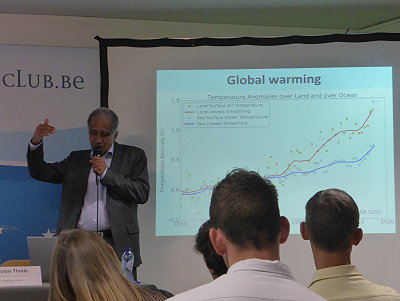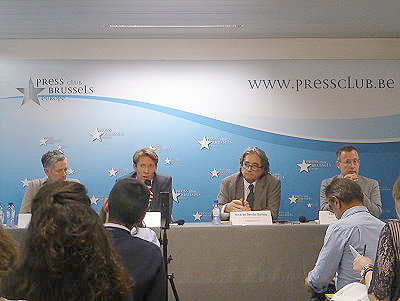 Bruxelles, 16 octobre 2017, Press Club Brussels - Europe. La Fondation Heinrich Böll a lancé son Atlas des océans réalisé avec l'aide de Future Ocean Kiel Marine Science dans une salle comble de la capitale européenne. L'atlas est composé de 18 courts chapitres avec des cartes synthétiques et des infographies pour illustrer les grands enjeux océaniques afin d'inviter plus de mesures protectrices dans la politique et la pratique.
Bruxelles, 16 octobre 2017, Press Club Brussels - Europe. La Fondation Heinrich Böll a lancé son Atlas des océans réalisé avec l'aide de Future Ocean Kiel Marine Science dans une salle comble de la capitale européenne. L'atlas est composé de 18 courts chapitres avec des cartes synthétiques et des infographies pour illustrer les grands enjeux océaniques afin d'inviter plus de mesures protectrices dans la politique et la pratique.
Klaus Linsenmeier, Director of the Böll Foundation's Brussels Office welcomed the participants and explained that the atlas had already been introduced to publics in Kiel and Berlin in order to stimulate greater awareness about the ocean among people of different walks of life, but particularly also among the political decision-makers. It was intended to underscore the need for continued careful study and greater protection of the ocean that is crucial for the climate, for sustaining food supplies and much more. So a special event in Brussels for representatives of the European institutions and civil society organisations was a must. He then invited Prof. Mojib Latif of GEOMAR to introduce the scientific highlights of the atlas.
Mojib Latif summarised the three major threats to the ocean today: overfishing, climate change and pollution.
"Fish is a cornerstone of global food security. It is the world's most traded natural product. But this global dependence on fish is actually the greatest threat to our fish populations. Many are overfished, and the number is rising." These are the opening remarks of the chapter fisheries management: fish - almost out of stock? accompanied by the graph of FAO showing the rapid decline of underutilised stocks between 1974 and 2013 and the increase of harmful subsidies, which in some cases, such as Germany, actually exceed the value of the fish caught.
 As for climate change, global warming already contributed 10 cm of sealevel rise through thermic expansion and another 10 cm on average from melting glaciers. Land (red line) was warming up faster than the ocean (blue line) as shown in the graph to the right, even though it had taken up more than 90% of the excess heat. By absorbing some 25% of the CO2 emitted, the ocean contributed in other ways to stabilising the climate, however, in the process it became more acidic - a serious problem for marine life with calcareous skeletons.
As for climate change, global warming already contributed 10 cm of sealevel rise through thermic expansion and another 10 cm on average from melting glaciers. Land (red line) was warming up faster than the ocean (blue line) as shown in the graph to the right, even though it had taken up more than 90% of the excess heat. By absorbing some 25% of the CO2 emitted, the ocean contributed in other ways to stabilising the climate, however, in the process it became more acidic - a serious problem for marine life with calcareous skeletons.
Mojib Latif underscored that at current rates, it was becoming almost impossible to meet the objetives of the Paris Climate Agreement and that it was important to understand that unlike on social issues, global warming could not be negotiated away. All measured trends strongly pointed in the wrong direction and there was no indication so far that countries and companies were doing nearly enough to stop the climate system spiralling out of control.
He could only mention very briefly the problem of microplastic in the ocean that came back to our plates through the marine foodweb. As there was no realistic way to get the plastic out once it had reached the ocean, he strogly recommended to stop adding microbeads into cosmetic and personal care products, phase out plastic bags completely and take other effective measures to prevent plastic litter large and small to reach the ocean in the first place.
The ensuing panel discussion featured Andràs Inotal of the European Commission (second from left), MEP Ricardo Serrão Santos (second from right), Ann Dom of Seas at Risk (to the left) and Torsten Thiele of the Institute for Advanced Sustainability Studies (IASS) in Potsdam (to the right), speaking in that order.
 Andràs Inotal of the Commission's DG MARE opened the panel statements on a high note suggesting that the ocean would be the 7th economic power in the world if it were to be compared with the economic power of nation states. In the EU alone, an estimated five million jobs were associated with the maritime industries. Within its remit the EU was ensuring a high degree of ocean protection through the Marine Framework Directive, maritime spatial planning, the reform of the Common Fisheries Policy, the forthcoming plastic directive and its investment in research amounting to €250 million in 2017.
Andràs Inotal of the Commission's DG MARE opened the panel statements on a high note suggesting that the ocean would be the 7th economic power in the world if it were to be compared with the economic power of nation states. In the EU alone, an estimated five million jobs were associated with the maritime industries. Within its remit the EU was ensuring a high degree of ocean protection through the Marine Framework Directive, maritime spatial planning, the reform of the Common Fisheries Policy, the forthcoming plastic directive and its investment in research amounting to €250 million in 2017.
Ricardo Serrão Santos congratulated the foundation to the production of the atlas as a good piece of science communication. He cautioned that some of the expectations raised around the appealing concept of Blue Growth could be unsubstantiated. The ocean was surely very important, e.g. for employment in the fishing industry followed by oil and gas according to a 2013 OECD report. 75% of global commerce was across the ocean and the biggest growth industry of all was currently tourism. But the sustainability concerns were tempering the hopes of continued growth. New threats were also arising from imminent start of deepsea mining and a global resource consumption that exceeded demographic growth. So the MEP issued a word of caution against potential hypes.
Ann Dom added a more critical note in that implementation by EU Member States of the many promising EU frameworks remained a major challenge. The promise of achieving healthy status in European waters by 2020 was clearly going to be missed by a large margin and continued thinking in sectoral silos turned out to be a major obstacle to making transitions towards a circular economy that aimed a greater efficiency and care in resource use. She was very skeptical about the political will to change strategies in deep enough a way to meet the self-set objectives. Beyond the EU she deplored that the obscure and underresourced UN body of the Seabed Authority had recently authorised deep sea mining even though that could in no way be done sustainably.
Torsten Thiele welcomed the atlas as a major contribution to ocean literacy. His focus was on global issues where he saw the urgency of concluding the WTO negotiations in 2017 with a prohibition of subsidies and advance in negotiations for a treaty to protect biodiversity on the high seas and usher in more ballast water treatment. He also saw many opportunities for investment into major infrastructure into ocean observation, including against illegal operations. A shift to more sustainable use, investment into green infrastructure and coastal protection represented a large investable potential.
The moderator then also allowed for a lively debate between the audience and the panelists that showed additional areas of interest not all covered by the atlas. So the primary objective of stimulating access to research and analysis about the ocean and critical reflection was certainly achieved. Now, let the action follow the ideas.
The major infographics are separately available here, while the entire atlas can be freely downloaded here.
Text and pictures are by CE Nauen








